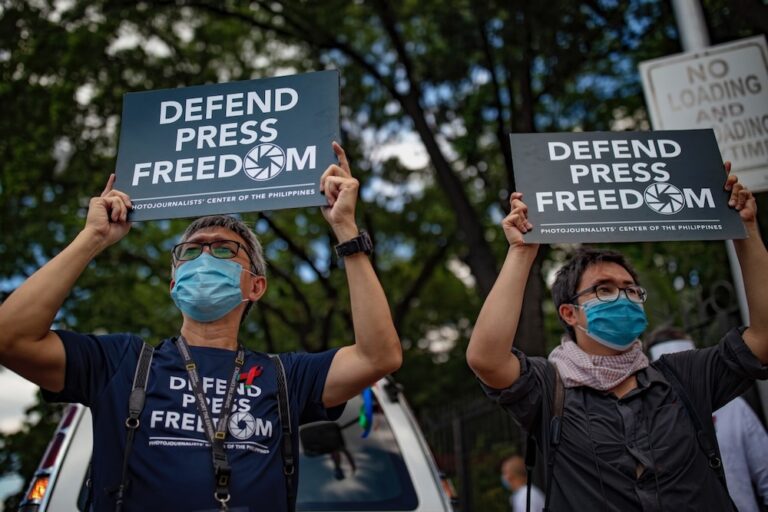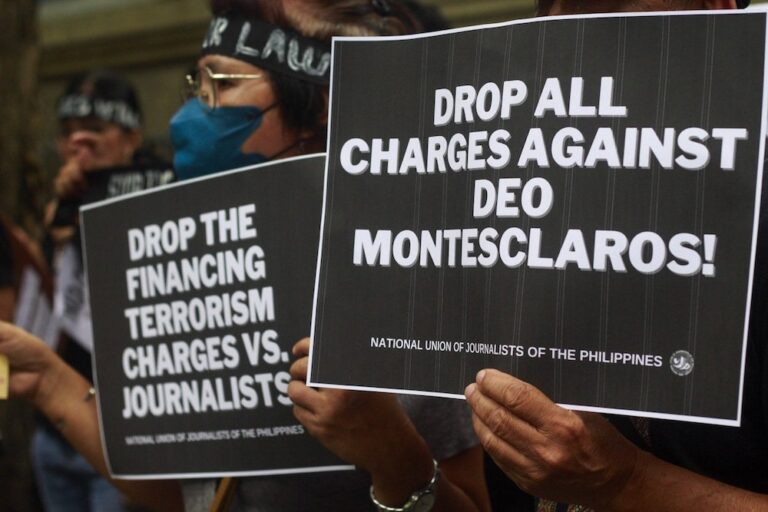(CMFR/IFEX) – A reporter covering the demolition of illegal housing units (shanties) along a national highway was allegedly harassed by a local police chief on 9 February 2006 in Malolos, Bulacan, located about 40 kilometers north of the nation’s capital, Manila. In a complaint forwarded to the Center for Media Freedom and Responsibility (CMFR), reporter […]
(CMFR/IFEX) – A reporter covering the demolition of illegal housing units (shanties) along a national highway was allegedly harassed by a local police chief on 9 February 2006 in Malolos, Bulacan, located about 40 kilometers north of the nation’s capital, Manila.
In a complaint forwarded to the Center for Media Freedom and Responsibility (CMFR), reporter Dino Balabo, correspondent for the local weekly “Mabuhay” and the national newspaper “The Manila Times”, said Malolos City Police Chief Manuel Lucban accosted him, twisting two of his fingers.
Balabo was first confronted by a member of the demolition team, who asked to see the reporter’s identification card (ID). The journalist, in turn, asked the man for his ID. The man – Ferdie Martin, a city employee – reluctantly complied, then called the police.
Within ten minutes, Lucban and three other officers arrived as Balabo was taking pictures of Martin cutting the power lines used by the shanties.
According to Balabo, Lucban approached him, asking if there was a problem. Balabo replied that his problem was Martin, and pointed his left index finger to the worker. In response, Lucban allegedly held the reporter’s index and middle fingers and twisted them around to point back at the reporter himself.
In an interview with CMFR, Lucban denied having twisted Balabo’s fingers. However, he admitted to holding down the journalist’s hand, claiming that he wanted to ease the tension between the two men.
Lucban claimed he even tried to make amends with Balabo two days later during a meeting with other journalists in a local restaurant, but that Balabo rejected his offer and refused to shake his hand. Lucban said Balabo obviously was not telling the truth about the incident, since the reporter refused to re-enact the incident in front of the other journalists present when invited to do so.
Balabo admitted to rejecting the officer’s offer of reconciliation, stating as his motive the officer’s having accused him of “being a liar” in front of his colleagues and other restaurant patrons.
Meanwhile, Balabo’s colleagues said that Lucban raised the tone of his voice during the “reconciliation” meeting, and repeatedly accused Balabo of fabricating his account of the incident. “He [Lucban] was obviously bluffing about the real incident,” said Carmela Reyes, a local correspondent of the “Philippine Daily Inquirer”, referring to the officer’s inconsistent statements.
A day earlier, when Rommel Ramos of Radio Veritas interviewed Lucban, he reluctantly confessed to holding Balabo’s fingers and apologized on air.
Lucban was assigned to Malolos in October 2005. He is reportedly a former member of the Presidential Security Group.
Jose Pavia, executive director of the Philippine Press Institute (PPI) and publisher-editor of “Mabuhay”, condemned the alleged harassment. “The mere holding of any physical parts of a civilian – a journalist, in this incident – who is not threatening to do any harm or violence is clearly harassment under the law,” Pavia stated.
The Freedom Fund for Filipino Journalists, Inc., PPI, and “Mabuhay” are considering filing complaints against Lucban with the Philippine National Police Headquarters in Camp Crame, Quezon City.


